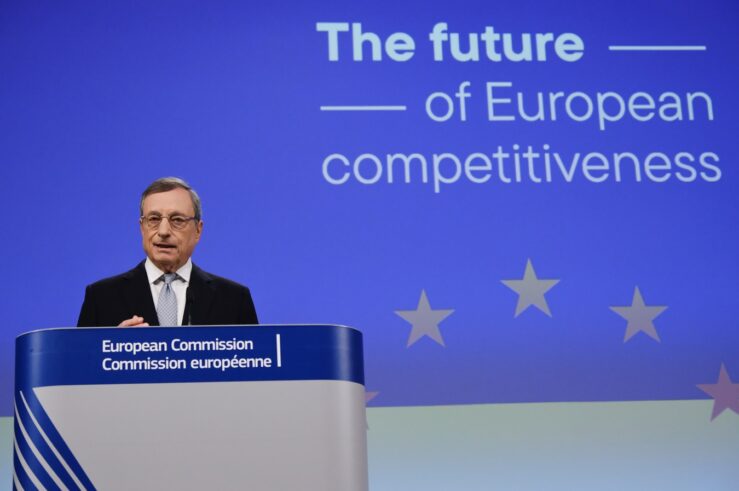Showing results for: “DMA”
Confronting the DMA’s Shaky Suppositions
It’s easy for politicians to make unrealistic promises. Indeed, without a healthy skepticism on the part of the public, they can grow like weeds. In the world of digital policy, the European Union’s Digital Markets Act (DMA) has proven fertile ground for just such promises. We’ve been told that large digital platforms are the source ... Confronting the DMA’s Shaky Suppositions
From Europe, with Love: Lessons in Regulatory Humility Following the DMA Implementation
The European Union’s implementation of the Digital Markets Act (DMA), whose stated goal is to bring more “fairness” and “contestability” to digital markets, could offer some important regulatory lessons to those countries around the world that have been rushing to emulate the Old Continent. The first regards “regulatory humility.” Designing ex ante regulation to promote ... From Europe, with Love: Lessons in Regulatory Humility Following the DMA Implementation
South Africa’s Competition Proposal Takes Europe’s DMA Model to the Extreme
The South African Competition Commission (SACC) has proposed changes to the nation’s digital-market regulation that could deal a significant blow to an already struggling South African economy. Ostensibly intended to protect online competition, the SACC’s plan to reshape the business models of “online intermediation platforms” like Google and Booking.com would entail a radical departure from traditional competition regulation. This ... South Africa’s Competition Proposal Takes Europe’s DMA Model to the Extreme
India Should Question Europe’s Digital-Regulation Strategy
A year after it was created by the Government of India’s Ministry of Corporate Affairs to examine the need for a separate law on competition in digital markets, India’s Committee on Digital Competition Law (CDCL) in February both published its report recommending adoption of such rules and submitted the draft Digital Competition Act (DCA), which ... India Should Question Europe’s Digital-Regulation Strategy
Digital-Market Regulation: One Size Does Not Fit All
Regulators around the globe are scrambling for a silver bullet to “tame” tech companies. Whether it’s the United States, the United Kingdom, Australia, South Africa, or Canada, the animating rationale behind such efforts is that firms like Google, Apple, Meta, and Amazon (GAMA) engage in undesirable market conduct that falls beyond the narrow purview of antitrust law (here and here). To tackle these supposed ... Digital-Market Regulation: One Size Does Not Fit All
The Road to Antitrust’s Least Glorious Hour
Things are heating up in the antitrust world. There is considerable pressure to pass the American Innovation and Choice Online Act (AICOA) before the congressional recess in August—a short legislative window before members of Congress shift their focus almost entirely to campaigning for the mid-term elections. While it would not be impossible to advance the ... The Road to Antitrust’s Least Glorious Hour
Draghi Report Highlights Why to Be Wary of the ‘Brussels Effect’
Everyone in Europe, and across the international competition-law sphere, seems to have their own interpretation these days of former Italian Prime Minister and European Central Bank President Mario Draghi’s recent report “The Future of European Competitiveness” (a.k.a., the “Draghi report”). And, of course, those various interpretations, unsurprisingly, inevitably match the interpreter’s policy preferences. This is ... Draghi Report Highlights Why to Be Wary of the ‘Brussels Effect’
AICOA Is Neither Urgently Needed Nor Good: A Response to Professors Scott Morton, Salop, and Dinielli
Earlier this month, Professors Fiona Scott Morton, Steve Salop, and David Dinielli penned a letter expressing their “strong support” for the proposed American Innovation and Choice Online Act (AICOA). In the letter, the professors address criticisms of AICOA and urge its approval, despite possible imperfections. “Perhaps this bill could be made better if we lived in ... AICOA Is Neither Urgently Needed Nor Good: A Response to Professors Scott Morton, Salop, and Dinielli
The View from Japan: A TOTM Q&A with Sayako Takizawa
Sayako, could you please tell us a bit about your background and area of specialization? I’m a professor at the University of Tokyo, teaching Japanese competition law and policy. How did you become interested in competition law and digital-competition regulation? I’ve been interested in the dynamics and history surrounding the regulation of freedom of trade. ... The View from Japan: A TOTM Q&A with Sayako Takizawa
Your Definitive End-of-Year Global Tech Regulation Wrap-Up: Who’s Doing What, Where, and What to Make of It
As 2023 draws to a close, we wanted to reflect on a year that saw jurisdictions around the world proposing, debating, and (occasionally) enacting digital regulations. Some of these initiatives amended existing ex-post competition laws. Others were more ambitious, contemplating entirely new regulatory regimes from the ground up. With everything going on, it can be ... Your Definitive End-of-Year Global Tech Regulation Wrap-Up: Who’s Doing What, Where, and What to Make of It
Latin America Should Follow Its Own Path on Digital-Markets Competition
In order to promote competition in digital markets,[1] Latin American countries should not copy and paste “solutions” from other jurisdictions, but rather design their own set of policies. In short, Latin American countries—like my own, Peru—should not “put the cart before the horse” and regulate markets that are not yet mature. Digital or “tech” markets ... Latin America Should Follow Its Own Path on Digital-Markets Competition
The Broken Promises of Europe’s Digital Regulation
If you live in Europe, you may have noticed issues with some familiar online services. From consent forms to reduced functionality and new fees, there is a sense that platforms like Amazon, Google, Meta, and Apple are changing the way they do business. Many of these changes are the result of a new European regulation ... The Broken Promises of Europe’s Digital Regulation
















